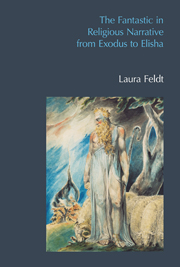Book contents
- Frontmatter
- Contents
- Acknowledgements
- Introduction: More Things—Marvels, Monsters, Miracles
- 1 Fields of Fantasy
- 2 Fantasy and Religious Narrative: Theory and Strategy
- 3 Marvels, Magic and Mystery: Reading the Fantastic in the Exodus Narrative
- 4 Between Wonder and Doubt: Fantastic Strategies, Their Effects and Status in the Exodus Narrative
- 5 Exodus as Mnemo-Fantasy: The Functions of the Fantastic in the Exodus Narrative
- 6 From Ethnogenesis to Everyday Life: Contextualizing the Fantastic in Hebrew Bible Narrative
- 7 Es spukt…—The Fantastic in Religious Narrative
- Bibliography
- Index of Biblical References
- Index of Authors
1 - Fields of Fantasy
- Frontmatter
- Contents
- Acknowledgements
- Introduction: More Things—Marvels, Monsters, Miracles
- 1 Fields of Fantasy
- 2 Fantasy and Religious Narrative: Theory and Strategy
- 3 Marvels, Magic and Mystery: Reading the Fantastic in the Exodus Narrative
- 4 Between Wonder and Doubt: Fantastic Strategies, Their Effects and Status in the Exodus Narrative
- 5 Exodus as Mnemo-Fantasy: The Functions of the Fantastic in the Exodus Narrative
- 6 From Ethnogenesis to Everyday Life: Contextualizing the Fantastic in Hebrew Bible Narrative
- 7 Es spukt…—The Fantastic in Religious Narrative
- Bibliography
- Index of Biblical References
- Index of Authors
Summary
In this chapter, I engage previous work in the field of studies of fantasy and religion (part 1), and in the exegetical tradition (part 2). The primary work of the chapter is to document that my agenda is previously untried and to provide backing for my theses. The first section of the chapter backs the thesis that fantasy theory may contribute fruitfully to the study of religious narrative, while the second backs the thesis that the fantastic elements of the Exodus narrative are sites of ambiguity and uncertainty to be interpreted in their literary contexts.
Since the study of religion has not paid much attention to the field of fantasy and religion, the first section maps this field, discerning the two main trends of religion-in-fantasy and fantasy-in-religion. I discuss previous work that suggests the relevance of bringing ‘religion’ and ‘fantasy’ to interact, and I position the present study in the field, noting its contribution. The second part of the chapter analyses the Exodus scholarship that has engaged with the narrative's fantastic elements, suggesting four main trends in previous work. I show how the fantastic elements are problematic issues in exegesis, and that the standard approaches to them do not fully address their literary and cultural work. Despite the centrality of fantastic elements in the Exodus narrative, a literary analysis of the fantastic elements and of their functions in their literary contexts is lacking.
- Type
- Chapter
- Information
- Publisher: Acumen PublishingPrint publication year: 2012



